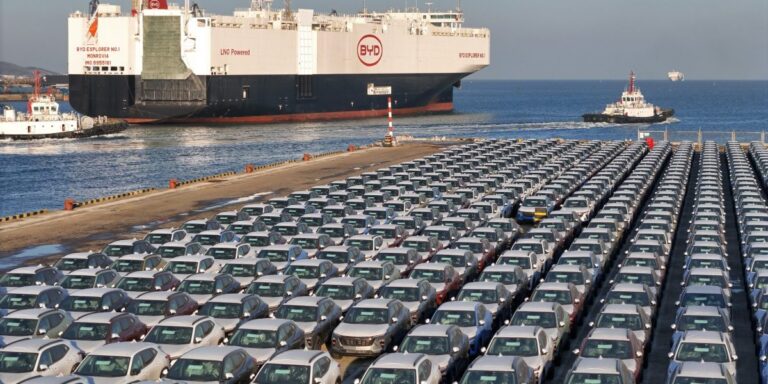
As a fleet of ships ships ultra-cheap electric vehicles like BYD to Europe from China, Europe’s helpless automakers are begging regulators to save them from a price war they cannot win.
The EU is expected to impose tariffs on Chinese carmakers following an investigation into anti-competitive practices after carmakers were left in a “state of shock” by BYD’s affordable cars.
Rhodium Group research has put a figure on the scale of tariffs needed to halt the advance of China’s electric vehicles into Europe. Unfortunately for local car manufacturers, this figure is much higher than what should be implemented by the EU.
In January, the European Commission announced its intention to visit the main Chinese car manufacturersincluding BYD and Geely, as part of an investigation into China’s alleged anti-competitive practices linked to state subsidies provided to manufacturers.
This follows comments made by European Commission President Ursula von der Leyen last September accusing China and its carmakers of market distortion, leading to the launch of an official investigation in October.
The impossible price war in Europe
Chinese electric vehicles enjoy many advantages over Western automakers. BYD, for example, controls its entire supply chain, with its battery supply a huge advantage.
This has helped them gain market share in Europe at a rapid pace. European imports of Chinese electric vehicles increased from $1.6 billion in 2020 to $11.5 billion in 2023, writes Rhodium. Chinese EVs expected to make up a quarter of all EVs sold on the continent this year, campaign group says Transport & Environment found.
Rhodium Group has quantified the scale of the challenge facing local automakers, using BYD’s affordable Seal U car as an illustrative example.
The car sells for €20,500 ($21,950) in China and €42,000 ($45,000) in the EU.
Chinese automakers are seeking to generate higher profits in Europe as a price war at home squeezes margins. This pricing mechanism means that the Seal U earns BYD a profit of €14,300 ($15,300) in the EU, but only €1,300 ($1,400) in China.
So it’s no surprise that tariffs are seen as the solution to stopping cheap Chinese electric vehicles from flooding the European market.
Elon Musk, CEO of Tesla, which is facing BYD in a price war in China, cited his first-hand experience during his details. what would be necessary to prevent car manufacturers from conquering Western markets.
“Our observation generally is that Chinese automakers are the most competitive automakers in the world,” Musk said during Tesla’s January earnings call.
“If there are no trade barriers established, they will virtually destroy most other automakers in the world,” he continued.
Attractive prices
However, the amount of tariffs required will likely make regulators wince, while falling well short of what is being considered by the European Commission.
Rhodium expects the EU to implement tariffs of 15-30% on Chinese electric vehicles following its investigation. But even at a higher level, the group says, it likely won’t deter automakers from shipping their products to the EU or ensuring price parity with local competitors.
Indeed, Chinese automakers’ profits in the EU are so enormous that only a spectacular tariff would be enough to deter automakers like BYD from selling electric vehicles in the country.
“According to our calculations, a 30% duty would still leave the company with a European premium of 15% (4,700 euros) compared to its profits in China, meaning that exports to Europe would remain very attractive,” writes the group.
“Duties in the range of 40-50% – arguably even higher for vertically integrated manufacturers like BYD – would likely be necessary to make the European market unattractive to Chinese EV exporters. »
Such a figure is indeed unrealistic at the moment, due to the WTO rules that the EU currently applies to trade with China.
Instead, Rhodium says the EU could turn to “non-traditional tools” to protect local automakers, such as restrictions based on environmental or national security factors.


